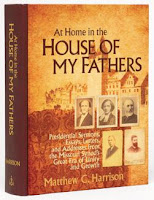[2024-09-08: added links to Harrison's book on the Internet Archive - quotes readable directly now.]
This continues from Part CM4b (Table of Contents in Part CM1) in a series defending Walther against a false portrayal by LC-MS President Matthew Harrison on the doctrines of Church and Ministry. — After researching Pres. Harrison's writings, especially his Romanizing tendencies in his editorial comments in his 2012 Church & Office book, I was struck by his earlier comments in his At Home in the House of My Fathers (or At Home) book (text © 2009). This was authored before he was elected as President in 2010. What was the difference? In the "Preface" of his 2012 Church and Office book is the following, p. xiv:
"As I perused the Catechism of the Catholic Church … I noted numerous points of remarkable convergence of Lutheran and Roman Catholic doctrine on the Office of the Ministry." [One only finds the opposite conclusions in all of Walther's writings.]
But then I read in his 2009 comments in his At Home book on Walther's 1848 Address to the Synod, "The Synod Has No Power But the Word of God", p. 1:
Do we believe in sola scriptura, or rather sola structura? After so many years of strife, political activity, and division, our only hope for unity is to regain Walther’s vision of a synod that knows no unity by compulsion, by human regulations and laws. The Synod has only the power of the Word of God. Where the Word is silent on a matter, there is freedom ruled by love. God grant us repentance so that the endless wrangling over bylaws gives way to a never-ending love for God’s inerrant Word. We shall find unity again as we humbly and avidly join together in deep repentance and reverent consideration of the Word of God. “To be sure, there are matters which the Word of God does not regulate [adiaphora], but which must be arranged in the Church. But all such matters are not to be arranged by any power above the congregation, but the congregation, that is, pastors and hearers, arranges them, free of every compulsion, as it is necessary and appears salutary.” As Walther says, “We have only the power of the Word.” Anything else ends in coercion, and the result is division.
And in the same book, Harrison's prefacing comments to Walther's 1879 Iowa District essay on the "Duties of an Evangelical Lutheran Synod" (At Home, p. 261-262):
…it is vital for all of us to give careful attention to this essay… we would do well to understand the beliefs, motives, and intention behind the formation of the Synod… The genius of Missouri was doctrinal unity and concern, combined with congregational freedom in matters not governed by the Word of God. And every congregation, no matter how small, had an equal voice in synodical life. This has worked for great consistency and stability.
In his earlier writings, Harrison gives no hint of his later assertions for "transcongregational", "supracongregational", and "synod as 'church'" expressions. Was he hiding this in 2009 or did he change his opinions? Only he knows. — In the next Part CM6a, we quote an important passage from Walther's 1879 Iowa District essay to get a footing on the doctrines of Church and Ministry. This essay will be used for the next 3 blog posts.


No comments:
Post a Comment
Comments only accepted when directly related to the post.